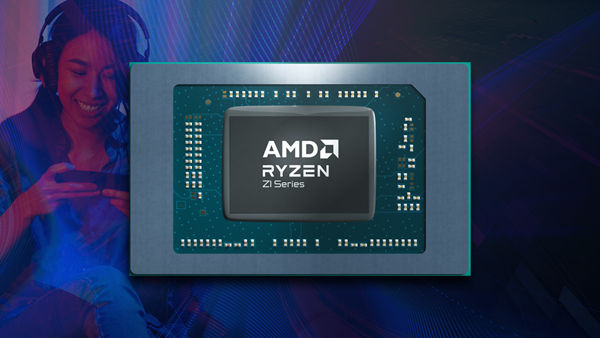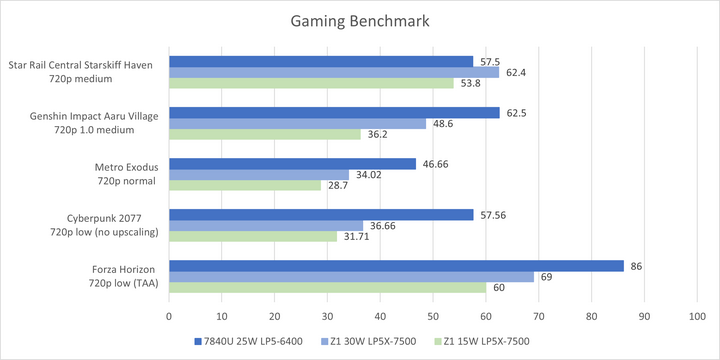Benchmarks Reveal Six-Core Ryzen Z1 Is Optimized for 15W Gaming
Even though the Z1 comes with 3x fewer RDNA3 CUs compared to the Z1 Extreme, it offers superb efficiency at 15W.

After months of waiting, benchmarks of AMD's vanilla Ryzen Z1 chip have finally surfaced, giving us some insight into the chip's performance before we see it appear in handhelds later this year like the ROG Ally. We first heard about the APU back in May, alongside the Z1 Extreme, as gaming-optimized mobile APUs designed for handheld gaming PCs, but only the Z1 Extreme was in reviewed systems.
Now, in a review published by David Huang on Zhulanlan using an unnamed gaming handheld, we've learned that that the Z1 excels specifically at low-TDP gaming featuring power ratings around 15W. At 15W, the chip is extremely efficient, featuring vastly superior performance per watt compared to the Ryzen 7 7840U at 25W. Huang
The Z1 and Z1 Extreme are based on AMD's Ryzen 7040 class of mobile CPUs, featuring the same Zen 4 CPU cores and RDNA3 iGPs. Both chips feature a 9W-30W configurable TDP. The Z1 Extreme offers 8 cores, 16 threads, a peak boost clock of 5.1 GHz, and 12 RDNA 3 CUs, while the vanilla Ryzen Z1 features 6 cores, 12 threads, a 4.9GHz boost clock and just four RDNA3 CUs.
David Huang ran the Z1 in several gaming benchmarks and compared the chip against the more powerful Ryzen 7 7840U which features the same specs as the Ryzen Z1 Extreme. Sadly, he did not test a Z1 Extreme for an apples-to-apples comparison, instead relying on the the 7840U to give an effective approximation of the Z1's performance against its more powerful sibling.
| Header Cell - Column 0 | AMD Ryzen 7 7840U | AMD Ryzen Z1 Extreme | AMD Ryzen 5 7540U | AMD Ryzen Z1 |
|---|---|---|---|---|
| AMD XDNA Architecture | Yes | No | No | No |
| Cores/Threads | 8/16 | 8/16 | 6/12 | 6/12 |
| Base clock | 3.3 GHz | Not specified | 3.2 GHz | Not specified |
| Boost clock (up to) | 5.1 GHz | Not specified | 4.9 GHz | Not specified |
| Cache | 24MB | 24MB | 22MB | 22MB |
| TDP | 15-30W | 9-30W | 15-30W | 9-30W |
| RDNA 3 Compute Units | 12 (Radeon 780M) | 12 | 4 (Radeon 740M) | 4 |
According to his gaming benchmark runs (which included Cyberpunk 2077, Metro Exodus, and Forza Horizon) the Ryzen Z1 offered playable performance at 720p and was only 20-50% slower than the Ryzen 7 7840U at 25W when operating under a 30W power limit.
The Z1 is even more impressive when its power envelope is cut in half to just 15W. At this power rating, the chip only loses 15-18% of its performance while cutting its power consumption in half. Even at 15W, the chip offered mostly playable performance, outputting 31 fps in Cyberpunk 2077 at 720 p/low, and anywhere between 36 to 60 fps in Genshin Impact, Star Rail Central Starskiff Haven, and Forza Horizon at 720p as well. The only game the Z1 had trouble with was Metro Exodus at 720p normal settings, with a frame rate just below 30FPS. But this problem can easily be remedied by dropping some settings or dropping the base resolution with upscaling.
It will be very interesting to see what this chip will do, once we finally see it in consoles like the ROG Ally — not to be confused with the Z1 Extreme variant that's already out. The Ryzen Z1's performance per watt is very impressive, given that the chip has three times less RDNA 3 CUs compared to the much more potent Ryzen 7 7840U. If the Ryzen Z1 Extreme behaves similarly to the 7840U, and loses even more performance at 15W, the baseline Ryzen Z1 could prove to be a very effective entry-level solution among gamers who care more about battery life than performance.
| Header Cell - Column 0 | AMD Ryzen 7 7840U | AMD Ryzen Z1 Extreme | AMD Ryzen 5 7540U | AMD Ryzen Z1 |
|---|---|---|---|---|
| AMD XDNA Architecture | Yes | No | No | No |
| Cores/Threads | 8/16 | 8/16 | 6/12 | 6/12 |
| Base clock | 3.3 GHz | Not specified | 3.2 GHz | Not specified |
| Boost clock (up to) | 5.1 GHz | Not specified | 4.9 GHz | Not specified |
| Cache | 24MB | 24MB | 22MB | 22MB |
| TDP | 15-30W | 9-30W | 15-30W | 9-30W |
| RDNA 3 Compute Units | 12 (Radeon 780M) | 12 | 4 (Radeon 740M) | 4 |
Get Tom's Hardware's best news and in-depth reviews, straight to your inbox.

Aaron Klotz is a contributing writer for Tom’s Hardware, covering news related to computer hardware such as CPUs, and graphics cards.
-
-Fran- You know... The Z1 wouldn't be such a polarizing APU (to me at least) if it had all the CUs and just lose those 2 cores. I could even accept lower clocks to go with that, but keep all the CUs. Hell, make it a 4 core and keep all the CUs and I would still think it's a great APU for handhelds. And yes, this is an exclusive comment for handhelds. Ultra-portables in the form of laptops more often than not do not care about graphical prowess.Reply
Regards. -
salgado18 Reply
Maybe in the future, they'll design chips exclusively for handhelds and mobile gaming devices. I think it is like that to make a jack-of-all-trades chip, because gaming handheld market is not big enough. But yes, I'd like that too.-Fran- said:You know... The Z1 wouldn't be such a polarizing APU (to me at least) if it had all the CUs and just lose those 2 cores. I could even accept lower clocks to go with that, but keep all the CUs. Hell, make it a 4 core and keep all the CUs and I would still think it's a great APU for handhelds. And yes, this is an exclusive comment for handhelds. Ultra-portables in the form of laptops more often than not do not care about graphical prowess.
Regards. -
-Fran- Reply
I mean, in all honestly, their APUs are now exclusively made for mobile (handheld or not), so it kind of is already a thing, maybe?salgado18 said:Maybe in the future, they'll design chips exclusively for handhelds and mobile gaming devices. I think it is like that to make a jack-of-all-trades chip, because gaming handheld market is not big enough. But yes, I'd like that too.
The desktop APUs are more like higher TDP models of the mobile APUs and now that they've added a 2CU iGPU into their desktop models, I'd be willing to say they'll be trying to put less APUs on the desktop side now which are "high performance". Well, this is being extremely generous with the 5700G :P
Regards.
